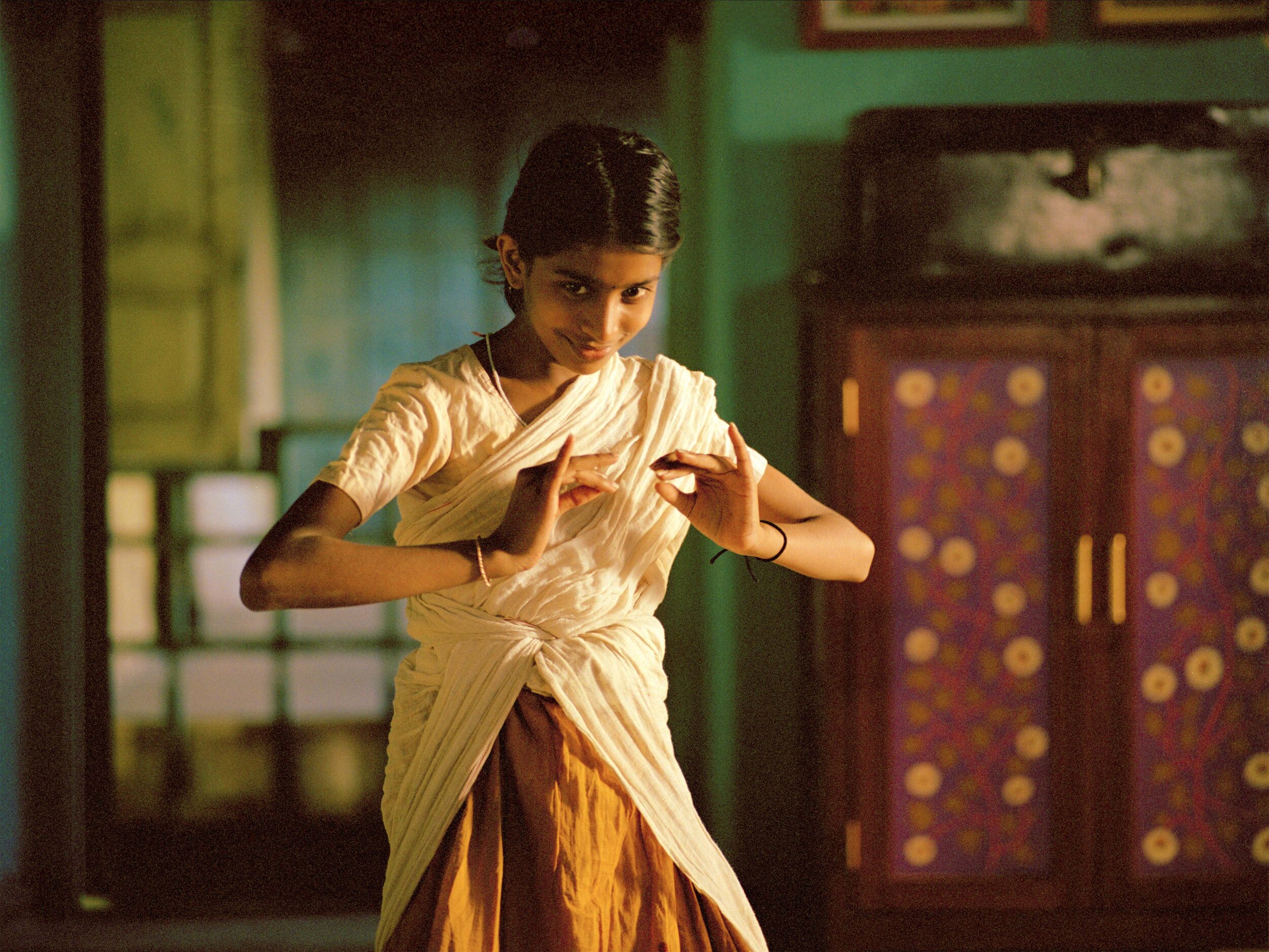
Sarasuda, Kuchipudi Dance
Download Vanaja Music
Links are in the right corners of Audio Players
The Disrobing of Queen Draupadi (Burra Katha)
The Disrobing of Queen Draupadi (Burra Katha)
This Burra Katha (Folk Storytelling) item occurs in the beginning of the feature film, Vanaja. Rural bards, from Telangana in South India, sing and relate a short episode from the Mahabharata. The Mahabharata is one of the two major Sanskrit epics of ancient India, and it tells the struggle between two groups of cousins in the Kurukshetra War. In this scene, one of the evil Kaurava cousins is attacking a queen (Draupadi) from the other cousin’s family. For a comic effect, the bards present this as if the queen is appealing to the children, who are watching the show, for help.
Burra Katha is endemic to South India. Before there was TV, villagers would gather in an open square, generally in the middle of the village, for such performances. Nowadays, such performances are infrequent.
In this scene, one of the storytellers loses a Bell from her foot. Vanaja, who is 14 years old, snatches it, and goes to return it after the show.
Dhim Dhim Ta
Dhim Dhim Ta
The first Kuchipudi Classical dance in the film is set on stage, and it is called a “Tillana”. The music begins with "Dhim Dhim Ta". These beginning words don't mean anything, but they are used to provide rhythm. Tillanas are fast paced items that are set to lively music.
In this scene, Vanaja is dancing for the first time on stage, and she is nervous. This is also a Dance competition. However, despite her anxiety, Vanaja gives a strong performance, and her teacher, who is the lady singing on stage to accompany her, is pleased with her performance. Vanaja wins some money for her work and returns home to her father in high spirits.
Sarasuda Jagelara
Sarasuda Jagelara
This Kuchipudi dance item is called a "Javali". It begins with the lyrics: "Sarasuda Jagelara". Sarasuda means "beloved", and Jagelara means "why do you delay?" In this dance, Vanaja is describing how beautiful she is, and telling her beloved to come early. She says that she is so talented that she taught the peacock how to dance; she is so beautiful that even the Gods wouldn’t be able to describe her beauty. She is being boastful, and also teasing at the same time. The lyrics and the music were composed by Ms. Indira Amperiani, one of the Music Directors of the feature film, Vanaja.
Savirahe
Savirahe
This Kuchipudi dance item is called "Savirahe" or “Sa-virahe”. The lyrics for this dance were composed by the 12th Century Indian poet, Jayadeva. The music was composed by Mr. Bhaskara S. Narayanan.
In this item, Vanaja is supposed to portray a sad lover who is waiting for her beloved to come to her. But instead of her beloved coming to her, her teacher, Rama Devi’s son, Shekhar, comes and stands in the doorway. Vanaja hates Shekhar, and her expression becomes angry. Not knowing why Vanaja has shown anger, Rama Devi scolds her.
Ta-ari Je
Ta-ari Je
This Kuchipudi dance item, “Ta-ari Je,” is a Jatiswaram. The words don’t mean anything, but instead, provide harmony and rhythm to the dancer.
In this item, the Landlady, Rama Devi, is teaching Vanaja Ta-ari Je under the trees. Vanaja is angry with her because she told people at a social gathering that Vanaja’s child was an orphan.
Vanaja’s dalliance causes her guru to get angry and fling a stick at Vanaja’s feet. Vanaja runs off stage.
Igiri Nandini
Igiri Nandini
This Kuchipudi item, “Igiri Nandini,” is the last dance in the film Vanaja, and it is meant to honor the Goddess Durga. The dance describes how Goddess Durga was created, and how she killed the demon, Mahishasura.
Long, long ago, when Mahishasura tormented people, sages ran to the Gods and begged for help. The Gods combined their powers and created the powerful Goddess, Durga. There is a mighty battle between her and the demon, but in the end, after 10 days, she pierces him with her Trident and kills him. The meaning of this dance is that it takes time and struggle for Good to overcome Evil.





